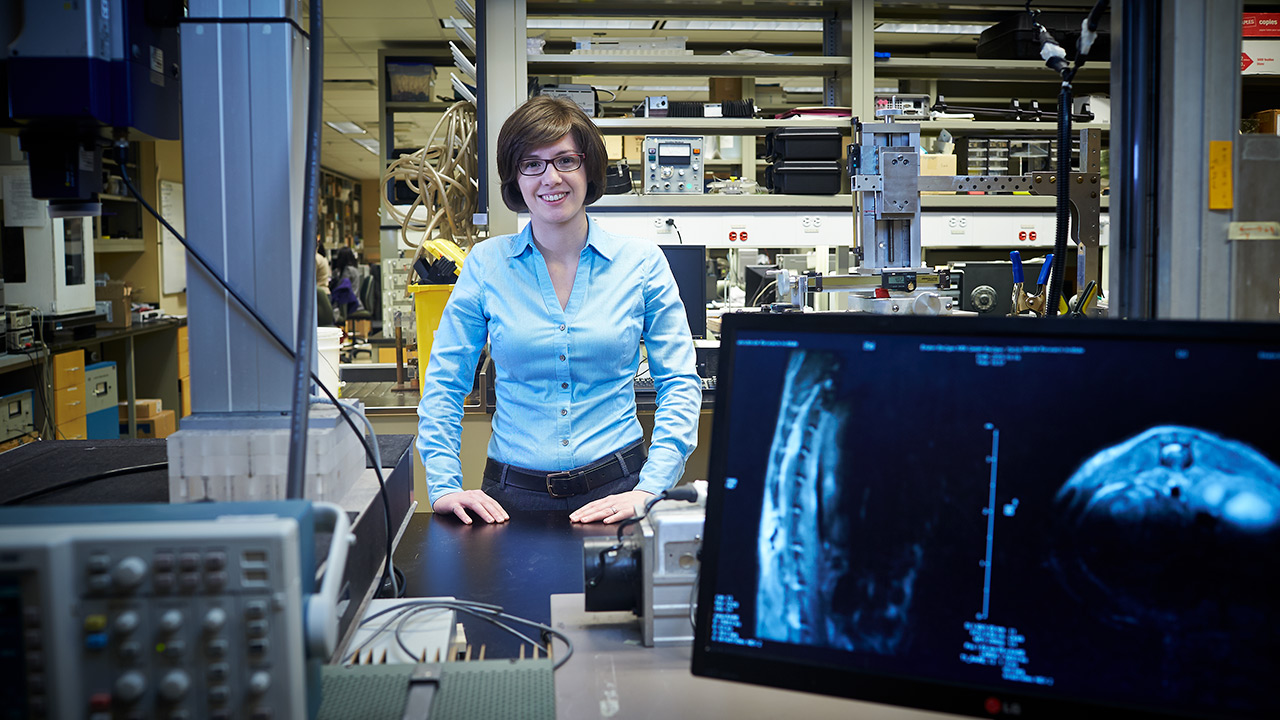Ultrasound research gets capital infusion
Drs. Christine Démoré and Meaghan O’Reilly, scientists in Physical Sciences at Sunnybrook Research Institute (SRI), have been awarded infrastructure grants from the Canada Foundation for Innovation and Ontario Ministry of Research, Innovation and Science to explore further the possibilities of therapeutic ultrasound. Combined, the scientists will receive more than $1.1 million.
“News of Christine’s and Meaghan’s awards is phenomenal. These two scientists are part of the next generation of leaders in image-guided therapeutics research, and the technological advances this financial support will enable are material,” says Dr. Michael Julius, vice-president of research at SRI and Sunnybrook.
Démoré will receive $861,966 over five years to develop innovative microultrasound technologies for clinical use. The aim is to facilitate high-resolution imaging for better image guidance and diagnosis via minimally invasive tools like miniature endoscopes and biopsy needles. The investment will fund a newly acquired dicing saw and precision micromachining equipment that will enable her to create miniature high-frequency ultrasound imaging probes.
One of Démoré’s goals, which will be made possible with the investment, is to advance the treatment of esophageal cancer. In 2017, 2,300 people in Canada were diagnosed with esophageal cancer, which has a five-year survival rate of 14%, thought to be related to late disease detection. In addition to designing the mini ultrasound probes, she will develop new imaging techniques that, altogether, will be able to detect cancer or precancerous tissue in the esophagus earlier, ascertain disease progression and guide minimally invasive removal of the tissue.
O’Reilly’s award of $240,000 will also be distributed over five years. “It’s great to get this funding. I’m thrilled,” she says. “We will be purchasing a scanning tank for conducting ultrasound field measurements, and we will also be getting a state-of-the-art multichannel transmit/receive unit for doing work with low-frequency ultrasound phased arrays.”
Heavily involved in the study of focused ultrasound, O’Reilly will concentrate her research on the spine and spinal cord. She will develop new ultrasound technologies that permit noninvasive ultrasound therapies free of harmful radiation for people with spinal cord tumours or other spinal conditions. She will analyze the interaction between ultrasound and spinal anatomy, and then apply her discoveries to the production of ultrasonic devices. The goal is to have these devices guide ultrasound around and through bony structures to target areas like the spinal cord and intervertebral disc.
Building on her prior preclinical work in the brain, O’Reilly will also image ultrasound treatments in the spinal cord to understand where sound interacts with the microbubble agents that activate therapy. “We will map the interactions and confirm that we’re targeting the right location. We will also use the technology to feed our algorithms to control the treatments,” she says.
The awards were announced in April 2018. The Canada Foundation for Innovation provides 40% of the total cost of a project. A further 40% comes from the Ontario Ministry of Research, Innovation and Science through a separate competition. In addition to these awards, 20% of the total project cost comes from investment by the home institution, in this case SRI.
The John R. Evans Leaders Fund and Ontario Small Infrastructure Fund provide researchers with the equipment required to do their work and remain, or become, leaders in their fields. As a result, this allows the institutions that support the scientists to be internationally competitive in research and technology development. The new equipment will be integrated into the Centre for Research in Image-Guided Therapeutics at SRI, which was established with a $75-milllion award from the Canada Foundation for Innovation.
In a nutshell
- The Canada Foundation for Innovation has awarded Drs. Christine Démoré and Meaghan O’Reilly more than $550,000 through the John R. Evans Leaders Fund, designed to support emerging innovators.
- The Ontario Ministry of Research, Innovation and Science has matched the grants in full through the Small Infrastructure Fund, for a total award of more than $1.1 million.
- The investment will be used to buy specialized equipment to carry out research into image-guided interventions.



